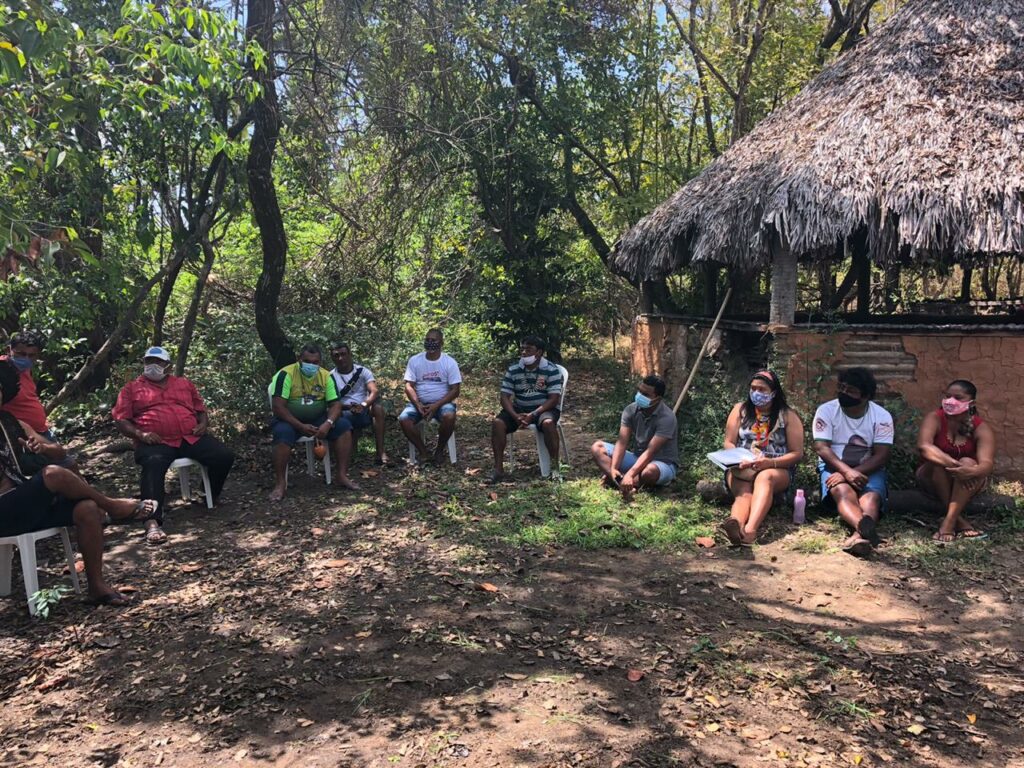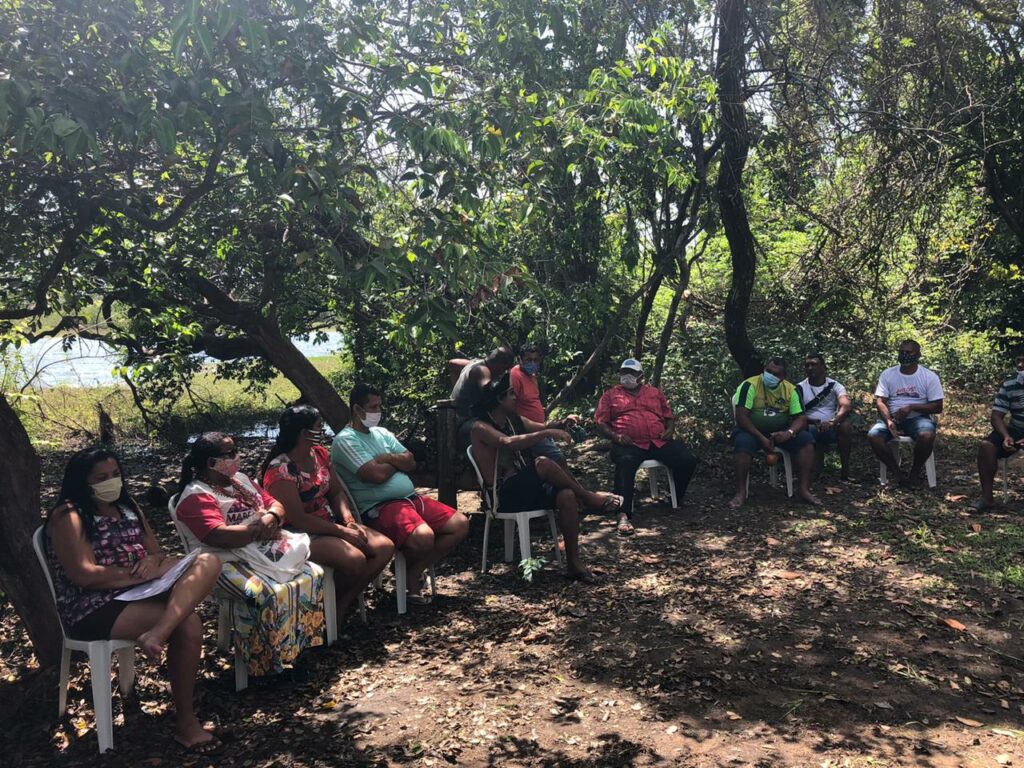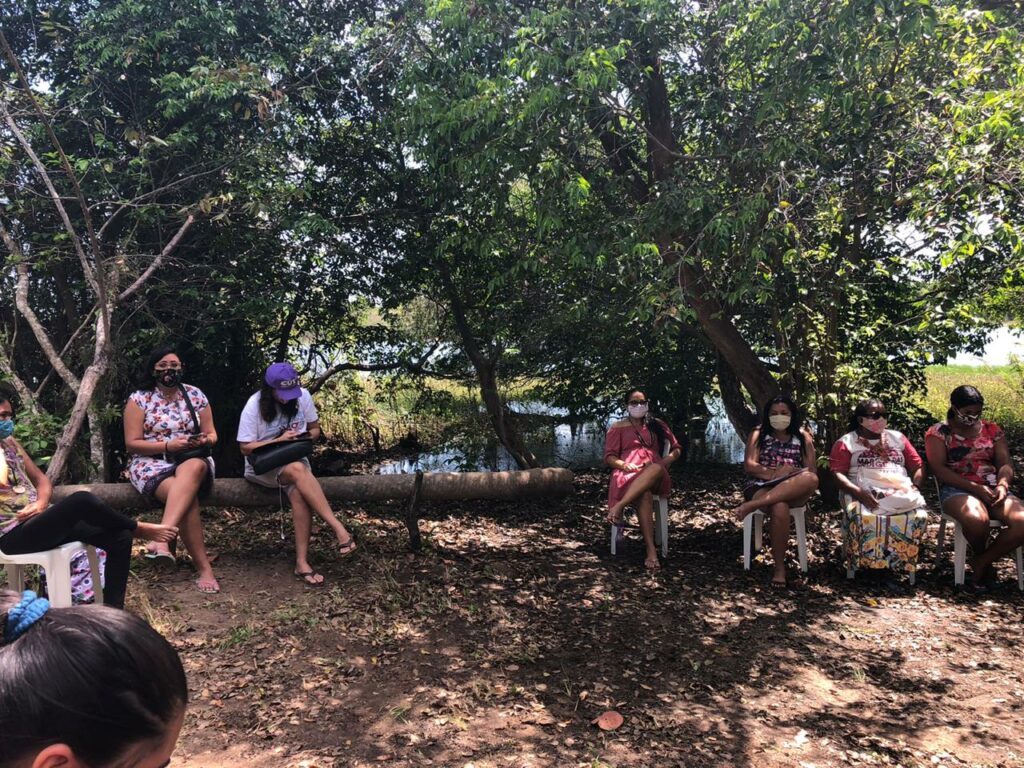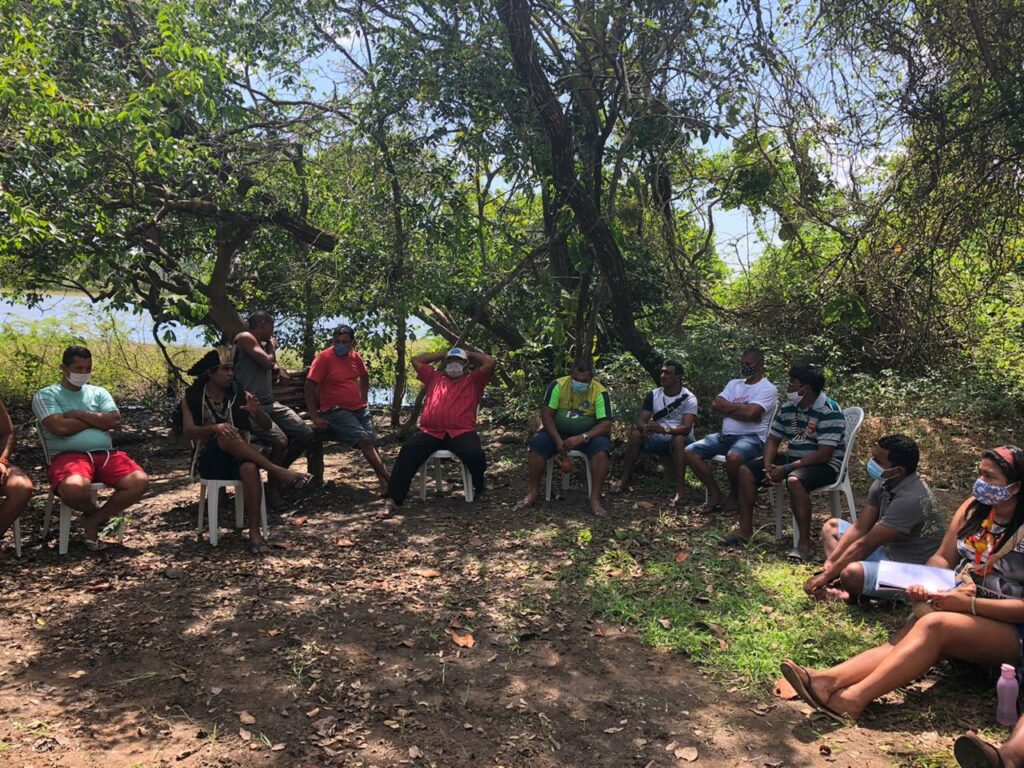Francisca Marciane do Nascimento Menezes -Tapeba
I am Marciane. I am 28. I am Tabeba, from the Vila dos Cacos community in the municipality of Caucaia (Ceará state). I am in the Indigenous Women’s Network of the Ceará state (Amice) and am also part of the Federation of Indigenous Peoples and Organizations of Ceará (Fepoince). I am executive secretary of the District Indigenous Health Council (Condisi), which work in conjunction with the Special Indigenous Sanitary District (DSEI) and with local councils. This issue of the coronavirus, which has affected the world, is no different for Indigenous populations. I usually say that we have our fragilities and our vulnerabilities, and I think that this has only become more and more accentuated. Here in our community, thank God, we haven’t had a single case. However, in some Tapeba communities, we’ve had cases, we’ve had deaths of relatives, of acquaintances, including at the company (where she works), of a work colleague who was also Indigenous.
The protocols we used, were to try to raise community awareness so that they would stay in their homes, so that they would avoid the entry of strangers, avoid the entry of people who aren’t part of the community. Fepoince, together with Indigenous organizations, did a brilliant job of procuring support from organizations to collect food, to get hygiene kits, to provide support to families who stopped practicing many of their customs collectively. Hunting, fishing, gathering fruit, cutting down carnauba fronds, are customs of our community, and part of its existence. The Indigenous movement helped many of our families who lost their livelihoods, so that they could receive support and try to get through this very complicated phase in the most dignified way possible.
We know that the Brazilian government has said openly that it is against Indigenous populations. This was long before the pandemic. With the pandemic, the health issue only got worse. We have been appealing to the federal government and to the Special Secretariat for Indigenous Health (Sesai) to grasp what our real interests were and our difficulties. It was also necessary for the [Indigenous] movement to show this. We recognize the effort that the Special Indigenous Sanitary District has made to make things happen. However, the biggest obstacles were at Sesai in Brasilia (in the Federal District), which is connected to the Ministry of Health, to the federal government. We lost relatives here among our people, including a work colleague, who was also Tapeba. So, this really disturbed us. We lost leaders and this also really upset us.
In relation to the issue of violence towards women, we realize that these numbers are rising. As I said, this is already a reality we have lived with, a fight that we have been waging, but, with the pandemic, I think it has only gotten worse. The numbers show this, and in our Indigenous territories it’s no different. We have been fighting so that these women can get help, and can denounce this kind of violence. We are still undergoing very complicated circumstances. However, together, we have learned a little about dealing with this situation.
It is still very difficult not being able to participate in a ritual, not being together as a collective, as we were accustomed to. It’s very difficult for us…Even for family relationships it is difficult, because we have the custom of getting together, of hugging, so it is very hard. We also think of our many relatives who have been taken by this disease, and we have to use the weapons we have. Spirituality is a very powerful weapon. (We must) really pray and ask the enchanted ones, ask Father Tupã, for this to pass in the best way possible, so that we can learn from this situation.
João Kennedy de Lima Oliveira – Tapeba
I am Kennedy Tapeba. I am 28, and am Tapeba, from Ceará state. Here in our Tapeba Indigenous Land (TI), we had some cases of Covid-19. Because of the large population, it is next to impossible to isolate, since we live near an urban area, within the municipality. We have had contaminated healthcare workers and Indigenous relatives from some Tapeba villages, as well.
The protocol is what WHO (the World Health Organization) advises – isolation. The Indigenous health agent (AIS) instructed families to stay home and for anyone with symptoms to take a test. Until they received the result, positive or negative, there was a great deal of care taken in suspect cases to remain isolated. Appointments at the health clinic were limited. We took the precaution of making gel alcohol and masks available, and gave instructions not to leave the community. We asked people to be very careful and to respect the quarantine. This was the guidance we sought to give to our relatives.
We feel this as Indigenous people. I am an Indigenous teacher. That dynamic, of being at school, in the classroom with the students, we don’t have any more. No more visits to our village elders ̶ for example, not being able to see my grandfather, my granny ̶ and spending time isolated because of Covid-19, was all very difficult at the beginning. However, we adapt, we get used to it, since we know that it is for our elders’ protection as much as for our own. We understand, but, for me, being Indigenous, this moment has been, and continues to be, very difficult.
We expect to beat Covid-19 by following WHO protocols, by following all the protocols that our health team has been issuing. We’ve been following them strictly, to avoid many losses during this process. However, we end up being affected. Like I said, I am an Indigenous teacher. So, this ends up affecting us directly and indirectly, not being able to have contact with my relatives or even go out, as we are used to…go out for meetings. So, this affects us directly. These are the main impacts. The question of one’s work, of going out…
I think this impacts the struggle. For example, being Indigenous we see many things happening, our lands at risk, with or without a pandemic, there is the process in some regions of seizing our land. In other moments, at other times, what would we do? We would occupy the National Indian Foundation (Funai), we would block a federal highway. But all this causes crowding and someone can be arrested. So, the only option is the courts. We follow the correct protocols, file law suits, appeal, so that situations like this don’t happen.
The greatest impact for us, as indigenous people, is the fact that we are on Indigenous lands, in the middle of a pandemic, but that doesn’t stop people who want to take our land from moving against us. So, we need to be ever vigilant. Unfortunately, we can’t use direct confrontation, we have to protect ourselves, our health and use the law to try to reverse these situations. I have had a few relatives diagnosed with Covid-19, but no one was lost, thanks to Father Tupã and Mother Tamaí. We did not lose a single close family member. Some of our acquaintances lost people, but we lost no close relatives, thanks to Father Tupã and Mother Tamaí.
Weber Tapeba
The Covid-19 pandemic claimed the lives of millions of people all over the world. In Ceará and in Brazil, the data is alarming, showing a sharp increase in confirmed cases of Covid-19. As long as scientists are unable to develop a vaccine capable of effectively fighting the disease, the best remedy is to stay at home. Social distancing is the best strategy to combat and confront the new coronavirus. This is no time to relax. For your sake, for mine, for all of our sakes: stay at home.



